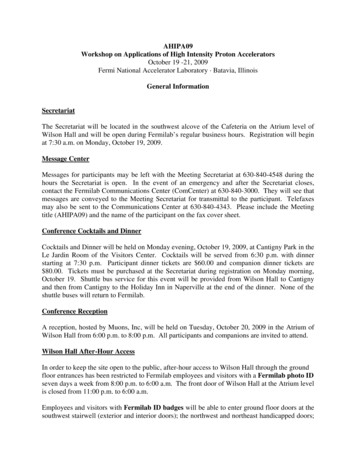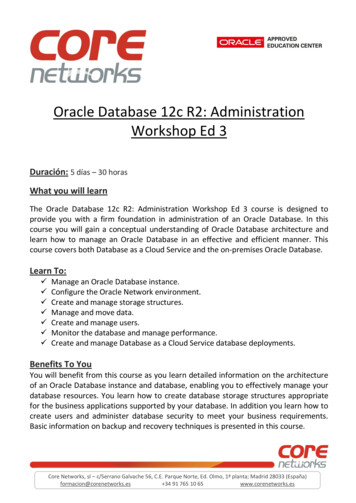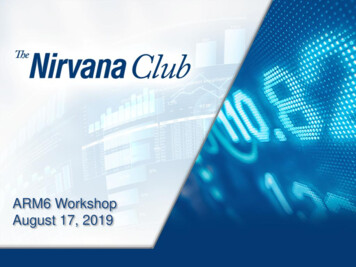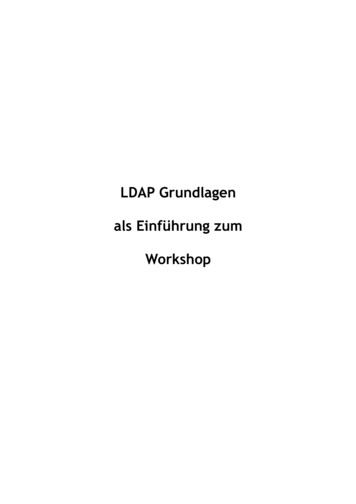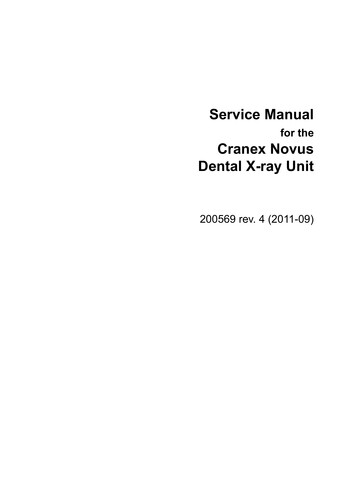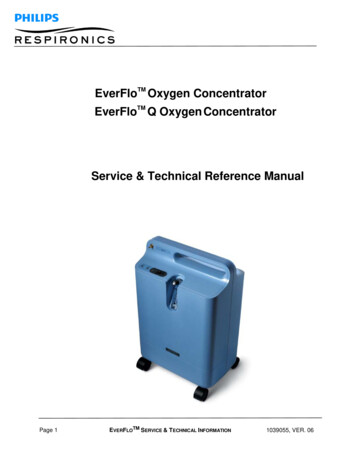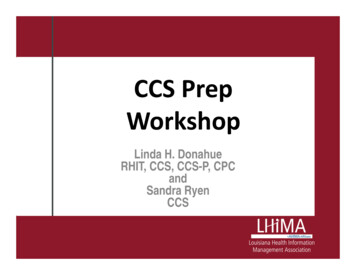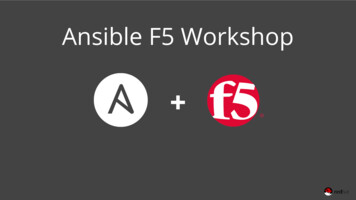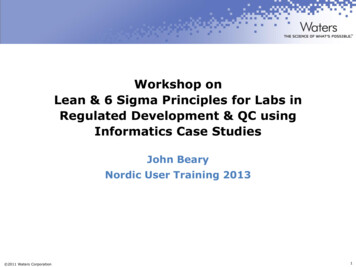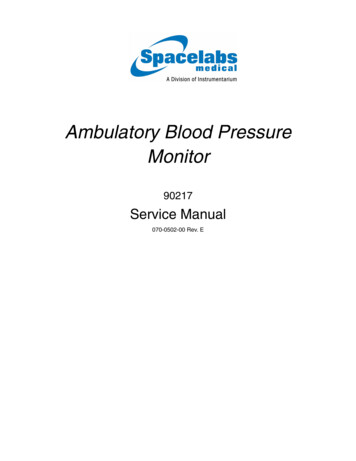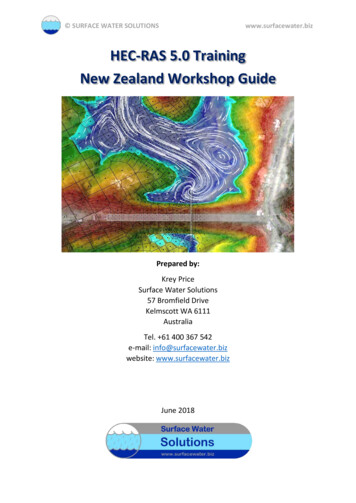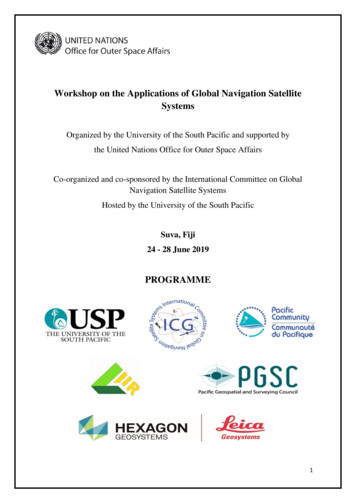
Transcription
Workshop on the Applications of Global Navigation SatelliteSystemsOrganized by the University of the South Pacific and supported bythe United Nations Office for Outer Space AffairsCo-organized and co-sponsored by the International Committee on GlobalNavigation Satellite SystemsHosted by the University of the South PacificSuva, Fiji24 - 28 June 2019PROGRAMME1
Venue: The University of the South Pacific, Laucala Bay CampusMonday, 24 June 201909:00 – 10:00Registration of participants10:00VENUE: Japan Pacific ICT CentreOpening and Welcome RemarksProf. Pal AHLUWALIA, Vice Chancellor, University of the South Pacific, FijiHon. Jone USAMATE, Minister for Infrastructure, Transport, DisasterManagement and Meteorological Services, FijiMs. Sharafat GADIMOVA, United Nations Office for Outer Space AffairsProf. Sushil KUMAR, University of the South Pacific, Fiji10:30 – 10:50Coffee Break10:50Session 1: Current status and future trends in global navigation satellitesystemsChairperson : Brett CARTER, AustraliaRapporteur : Shreya SARKAR, India10:50 – 11:10Global Positioning System (GPS): Status and development, Jeffrey AUERBACH,United States of America11:10 – 11:30Global Navigation Satellite System (GLONASS): Status and development,Sergey RYBKIN, Russian Federation11:30 – 11:50Status Update on the European Satellite Navigation System (GALILEO), DanielBLONSKI, European Union11:50 – 12:10BeiDou Navigation Satellite System (BDS): Status and Development, ZengZHAOXIAN, China12:10Session 2: GNSS based applicationsChairperson: Dinesh MANANDHAR, JapanRapporteur : Balwinder Singh ARORA, Australia12:10 – 12:30Development of precise positioning capabilities in mass market devices, MattHIGGINS, Australia12:30 – 12:50Dissemination of real-time and post-mission value added GNSS-data – A GlobalOperator’s Perspective, Razig NOOR, Australia12:50 – 13:10Concepts of Creating a Geodetic Adjustment, Ed CARLSON, United States ofAmerica13:10 – 14:10Lunch Break14:10VENUE : N111 Lecture TheatreSession 2: GNSS based applications (continues)Chairperson: Louie P. BALICANTA, The PhilippinesRapporteur : Thayahip THONGTAN, Thailand2
14:10 – 14:30Bridging the gap between high altitude remote sensing and ground-basedsurvey for marine conservation planning, Subhash CHAND, New Zealand14:30 – 14:50GNSS receiver autonomous integrity monitoring-based on vector tracking loop,Farah UZMA, Pakistan14:50 – 15:10Low-cost GNSS receiver system for high-precision GNSS data collection,Dinesh MANANDHAR, Japan15:10 – 15:30Application of BeiDou in Natural Disaster Emergency Management in China,Yongfeng LIAO, China15:30 – 15:40Questions and Discussions15:40 – 16:00Coffee Break16:00Session 3: GNSS applications: National Programmes and projectsChairperson: Subhash CHAND, New ZealandRapporteur: Siti Aminah BAHARI, Malaysia16:00 – 16:20GNSS time transfer: Receiver internal delay determination, ThayathipTHONGTAN, Thailand16:20 – 16:40Migration from Fiji Geodetic Datum 1986 (FGD86) to International TerrestrialReference Frame, Asakaia TABUA, Fiji16:40 – 17:00Applications of GNSS in Tuvalu, Faatasi MALOLOGA, Tuvalu17:00 – 17:20The use of GNSS based technology in Vanuatu, Atishnal CHAND, Vanuatu17:20 – 17:40GNSS applications to make lives better in the Pacific-SkyEye Pacific, EbonyJean TA’ AVILI, Samoa17:40 – 18:00The Plan for Development of a Modern Height System for Tonga, ViliamuFOLAU, Tonga18:00Adjourn18:30Welcome DinnerTuesday, 25 June 201909:00VENUE: N111 Lecture TheatreSeminar on GNSS Spectrum Protection and Interference Detection andMitigationModerators: Jeffrey AUERBACH and Daniel BARNES, ICG Working Group SThe purpose of the seminar is to highlight the importance of GNSS spectrumprotection at the national level and to explain how to reap the benefits of GNSS.Discussions between the ICG experts presenting the material and the workshopparticipants will also be held.09:00 – 11:00I.II.Introduction and OverviewIntroduction to GNSS11:00 – 11:20Coffee Break11:20 – 13:00III.13:00 – 14:00Lunch BreakSpectrum Management3
14:00Technical tour/City tour18:00AdjournWednesday, 26 June 201909:0009:00 – 11:0011:00 – 11:20VENUE: N111 Lecture TheatreSeminar on GNSS Spectrum Protection and Interference Detection andMitigation (continues)Moderators: Jeffrey AUERBACH and Daniel BARNES, ICG Working Group SIV.Spectrum ProtectionCoffee Break11:20 – 13:00V.VI.13:00 – 14:00Lunch Break14:00Session 4: Space WeatherChairperson: Ebony-Jean TA’AVILI, SamoaRapporteur: Sein MIN, Myanmar14:00 – 14:20Monitoring and mitigating space weather effects for GNSS applications,Balwinder Singh ARORA, Australia14:20 – 14:40On the predictability of Equatorial Plasma Bubbles for GNSS users, BrettCARTER, Australia14:40 – 15:00Simulating Ionospheric mitigation on GNSS-based application, SlametSUPRIADI, Indonesia15:00 – 15:20Modelling the ionospheric TEC over Malaysia using SCHA, Siti AminahBAHARI, Malaysia15:20 – 15:40Ionospheric Scintillation of GNSS signals: Impacts and mitigation, KEITHGROVES, United States of America15:40 – 16:00Ionospheric response to Space Weather Events in March 2013 and 2015 andtheir Comparison with Similar Strength Storms of July 2012 and June 2015,Sushil KUMAR, The University of the South Pacific, Fiji16:00 – 16:20Coffee Break16:20Session 5: Geodetic Reference NetworksChairperson: Viliamu FOLAU, TongaRapporteur: Tion URIAM, Kiribati16:20 – 16:40Transitioning to the United States 2022 National Coordinate System WithoutGetting Left Behind, Ed CARLSON, United States of America16:40 – 17:00Updating Fiji’s Maritime Survey ITRF 2005 to ITRF 2014, Vasiti SOKO, Fiji17:00 – 17:20National geodetic reference frame of Myanmar, Sein MIN, MyanmarInterference Detection and MitigationSummary/Interactive discussions4
17:20 – 17:40Linking the different coordinate systems in the Philippines using GNSS, LouieBALICANTA, the Philippines17:40 – 18:00SW maps for low cost GNSS receiver systems, Dinesh MANADHAR on behalfof Avinab MALLA, Nepal18:00AdjournThursday, 27 June 201909:00VENUE: Australia Pacific Lecture Theatre (092-001)Panel Discussion: Sustainability and Modernisation of GNSS CORS andGeospatial Infrastructure through Capacity DevelopmentModerators: John DAWSON, UN GGIM AP WG1, Allison CRADDOCK, IGSand Robert SARIB, FIG Asia Pacific Capacity Development NetworkThe purpose is to provide the Pacific community with information in relation toimportance of “planning” and its link to the “why, what and how” of developing"long term" capability with respect to GNSS CORS and GeospatialInfrastructure and related activities.09:00 – 11:00 “Why, what and how” of GNSS CORS and Geospatial Infrastructure,John DAWSON, UN GGIM AP WG1 – Geodetic Reference Frames Purpose and value of the UN / World Bank - Integrated GeospatialInformation Framework, and the Sustainable Development Goals wrtGNSS CORS and Geospatial Infrastructure, Allison CRADDOCK, UNSubcommittee on Geodesy - Education, Training and CapacityBuilding Perspectives on business / operational / action plans for thesustainability of GNSS CORS and Geospatial Infrastructure, RobSARIB, FIG Asia Pacific Capacity Development Network Case study of the regional strategy Position the Pacific for the Future Pacific Geospatial Surveying Council, Andrick LAL, PGSC and PacificCommunity11:00 – 11:20Coffee Break11:20Panel Discussion: Sustainability and Modernisation of GNSS CORS andGeospatial Infrastructure through Capacity Development (continues)Moderators: John DAWSON, UN GGIM AP WG1, Allison CRADDOCK, IGSand Robert SARIB, FIG Asia Pacific Capacity Development Network11:20 – 13:00 Examine case studies from Tonga, Sosefo KAITAPU, and Fiji, AsakaiaTABUA, Surveyor – General Verify the capacity challenges, immediate needs and goals to developGNSS and Geospatial infrastructure capability Examine the importance of GNSS CORS and Geospatial infrastructurein the Pacific Develop mechanisms to support regional collaboration5
13:00 – 14:00Lunch Break14:00Special Technical Session: Standards and Interoperability of Precise PointPositioning ServicesModerators: Suelynn CHOY and Daniel BLONSKI (on behalf of the ICGWorking Groups D, B and S)14:00 – 14:10Opening remarks14:10 – 14:30Multisystem GNSS receivers for high-precision applications with using globalhigh-precision service, Andrey VEITSEL, Russian Federation14:30 – 14:50Status and prospects of the Russian PPP System for high-precisiondetermination of Navigation and Ephemeris-time Information, VladimirPASYNKOV, Russian Federation14:50 – 15:10PPP activity updates and plans of QZSS, Kyohei AKIYAMA, Japan15:10 – 15:30Recent Activity of International Standardization for High-Accuracy GNSSCorrection Service, Rui HIROKAWA, Japan15:40 – 16:00Coffee Break16:00Special Technical Session: Standards and Interoperability of Precise PointPositioning Services (continues)Moderators: Suelynn CHOY and Daniel BLONSKI (on behalf of the ICGWorking Groups D, B and S)16:00 – 16:2016:20 – 16:40Galileo Status and High Accuracy, Daniel BLONSKI, European UnionTechnical Issues for GNSS PPP Interoperability, Daniel BLONSKI, EuropeanUnionDevelopment of BDS and Study of PPP Timing, Rui TU, China16:40 – 17:0017:00 – 17:20The Australian SBAS Program: Progress and Motivation for a PPP Service,Simon REYNOLDS, Australia17:20 – 17:40On the interoperability of GNSS clock and bias products for precise pointpositioning with ambiguity resolution, Simon BANVILLE, Canada17:40 – 18:00GNSS Precise (Point) Positioning: Where to from here ? Suelynn CHOY,Australia18:00AdjournFriday, 28 June 2019(In parallel): CLOSED SESSION: ICG Members Only –Discussion and preparation ofpotential draft recommendation(s) to ICG-14 @ Bangalore and actionsVENUE: USP ICT Videoconference Room 209:00VENUE: Australia Pacific Lecture Theatre (092-001)Session 6: Capacity building and International/National experiences in theuse and implementation of GNSS technologiesChairperson: Atishnal CHAND, VanuatuRapporteur: Dinesh MANANDHAR, Japan6
09:00 – 09:20Capacity Building of GNSS Education in China and its enlightenment, JungGUIFEI, China09:20 - 09:40GNSS and the Pacific Community, Andrick LAL, South Pacific Community,Fiji09:40 – 10:00GNSS activities in Mongolia, Ochirkhuyag LKHAMJAV, Mongolia10:00 - 10:20GLONASS: Present and Future, Shreya SARKAR, India10:20 – 10:40Angola-Russia cooperation in the development of GNSS monitoring groundstation: capacity Building for Angolan Specialists, Amaro Francisco AlbertoJOAO and Solana Gracierre da Costa FERREIRA, Angola10:40 – 11:00Development and application of national Beidou ground-based augmentationsystem, Haoyu LOU, China11:00 – 11:20Kirbati Maritime Boundaries Project, Tion URIAM, Kiribati11:20 – 11:40The USP Bachelor of Geospatial Science – Capacity Building and CommunityEngagement using GNSS, Nick ROLLINGS, Fiji11:40 – 12:40Discussion SessionModerators: Sharafat GADIMOVA, United Nations Office for Outer SpaceAffairs and Sushil KUMAR, The University of the South Pacific, Fiji 12:40 – 13:00Concluding Remarks 13:00 – 14:00International/Regional collaboration opportunities that could beestablished in order to promote the use of enabling space technologies,and the workshop follow-up projects/initiatives;Requirements of implementing, mechanisms and resources fordeveloping of partnerships and networks;Type and level of training required for addressing enabling spacetechnologies and their applications;Next steps (proposals for future workshops/training courses).Concluding remarks by the sessions co-chairs/moderatorsSharafat GADIMOVA, United Nations Office for Outer Space AffairsSushil KUMAR, The University of the South Pacific, FijiLunch Break7
17:20 – 17:40 GNSS applications to make lives better in the Pacific-SkyEye Pacific, Ebony-Jean TA’ AVILI, Samoa 17:40 – 18:00 The Plan for Development of a Modern Height System for Tonga, Viliamu FOLA
